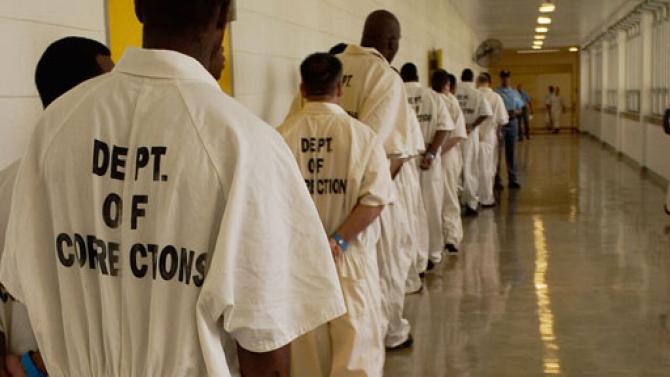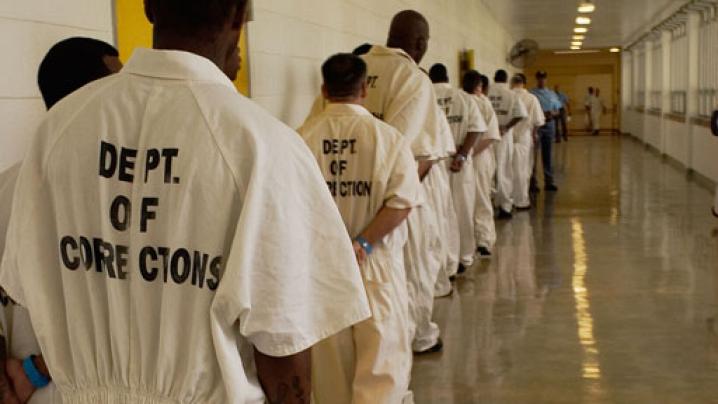[ad_1]

From National Geographic Channel’s Locked In, inmates in line to enter the Georgia Diagnostic and Classification Prison cafeteria.
Derek Bell
Charles McKinney is a convicted felon, and he has horror stories to tell about his quest to find work once he got out of jail.
“You drift from job to job so you don’t get the question asked, ‘Have you ever had a felony?’” McKinney says. “Once I came home … instead of being faced with the possibility of detection, I applied for things like construction work because you can get hired without going through all the red tape.”
McKinney, a Vietnam vet, committed two armed robberies after moving to New Jersey from Florida. He was caught the second time, but because of his military record, instead of the 25 years he faced in prison, the charge was dropped to robbery and he served just 17 months.
“God is such a good God,” McKinney says.
He spent years in construction jobs, afraid of what he heard from fellow former inmates about the problems they had with background checks in trying to find work. Eventually he drove a taxi, then trucks for the few companies willing to hire someone with a felony record. But the money was tight, even though both he and his wife were working.
“We stayed in low-income housing,” McKinney explains, adding that luckily, they had family who were able to pitch in when they ran short. “I didn’t really see it as bad, even though there were times we couldn’t pay the rent.”
Many former inmates with felony or serious misdemeanor arrests are in worse straits, because a new report finds that all 50 states and Washington, D.C., have legislation restricting employment. The “Jobs After Jail: Ending the Prison to Poverty Pipeline” report (pdf) notes that those restrictions affect those with any type of felony conviction; some nonfelony convictions, including controlled substances; and some kinds of misdemeanors. It was done by the Alliance for a Just Society, a Washington, D.C.-based coalition of 15 racial-, social- and economic-justice organizations.
“We knew it was tough for people with records to get jobs, but it’s not just about discriminatory attitudes,” says report author Allyson Fredericksen. “These laws … ban people with conviction records from different types of employment, even if it seems they’ve been trying to rehabilitate themselves.”
There are a total of 6,392 such restrictions nationwide, the report finds—389 in Louisiana alone, followed by Illinois with 258, Texas with 248 and New Hampshire with 240. Fredericksen adds that many of the restrictions bar convicted felons from such health care jobs as optometrist or veterinarian, or from various public safety and legal occupations.
“It seems like these were laws that were enforced for public safety reasons, but in our analysis, it looks like many of them are farther-reaching than they might need to be,” Fredericksen explains.
She adds that not only do such laws often keep former inmates in low-paying jobs that don’t allow them to rebuild their lives and sentence them to lives of poverty; they also disproportionately affect people of color.
“The mass incarceration and criminalization of people of color enforces the racial wealth gap,” Fredericksen says. “The impact is devastating on communities of color.”
The “Jobs After Jail” report makes several recommendations, including eliminating lifetime legislative bans to employment, reforming policies on court fines and fees that leave people deep in debt after they are released, and banning the box on job applications that asks about convictions.
But Jack Mazloom, with the Nashville, Tenn.-based National Federation of Independent Business, says that many of its 330,000 members feel that the movement to ban the box just complicates the hiring process.
“A criminal conviction is public information anyway,” Mazloom explains. “Our members tell me, ‘We have nothing against giving someone a second chance,’ but they want to have the conversation. Ban the box doesn’t allow the conversation.”
Mazloom says that many of the members of the NFIB, 90 percent of which have fewer than 20 employees, are already more likely to hire people with criminal backgrounds because such prospective employees are often from their communities. But he says that small and independent business owners would rather be able to ask applicants about their criminal histories and ask them to explain why an employer should believe they won’t do anything wrong again. Mazloom adds that larger companies with big human resources departments have the wherewithal to ban the box, but smaller companies have to handle the hiring process all on their own.
“Nobody argues that it is not a social crisis to have millions of people not participating fully in the economy because of a criminal background,” Mazloom says, “but it is also a false idea that everybody deserves a second chance. The prisons are filled with people who used their second chance to commit crime.”
He says that the assets, reputation and legal liability of small businesses are on the line if an employee does something wrong.
But Fredericksen at the Alliance for a Just Society argues that banning the box doesn’t require an employer to hire somebody with a conviction record. It does, however, allow such a person to get an interview in the first place, she says.
“When someone is sentenced to jail … whether it is five years or 50 years … that sentence should not continue afterwards,” Fredericksen says. “And if it does, that means there’s a bigger issue with the legal system.”
McKinney has been luckier than most. After years of bouncing from job to job, in 2011 the former inmate had the chance to take over his family’s business. He now owns Trinity Laundry in Eatonville, Fla., one of the first self-governing African-American towns in the nation. McKinney has some advice for others with convictions who are out there in a very tough job market.
“The way the system is set up now, there’s a big possibility we might not be able to achieve some of the things we hoped because of this rejection as a felon,” McKinney says. But, he adds, “I believe there’s always someone out there willing to give you a second chance.”
[ad_2]






















